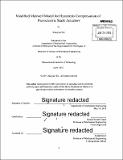| dc.contributor.advisor | Kamal Youcef-Toumi | en_US |
| dc.contributor.author | Xie, Xiaoyue, S.B. Massachusetts Institute of Technology | en_US |
| dc.contributor.other | Massachusetts Institute of Technology. Department of Mechanical Engineering. | en_US |
| dc.date.accessioned | 2015-09-17T19:09:23Z | |
| dc.date.available | 2015-09-17T19:09:23Z | |
| dc.date.copyright | 2015 | en_US |
| dc.date.issued | 2015 | en_US |
| dc.identifier.uri | http://hdl.handle.net/1721.1/98747 | |
| dc.description | Thesis: S.B., Massachusetts Institute of Technology, Department of Mechanical Engineering, 2015. | en_US |
| dc.description | Cataloged from PDF version of thesis. | en_US |
| dc.description | Includes bibliographical references (page 29). | en_US |
| dc.description.abstract | This thesis presents new observations of the hysteresis behavior of piezoelectric stack actuators and proposes an Input-Range Dependent Maxwell Model for more accurate hysteresis compensation. Experimental studies show that the assumptions of the classical Maxwell model do not fully hold: the actuator behaves differently in the initiation stage compared to the later cycles, and the parameters of the Maxwell model are dependent on the input history. Two most prominent factors are the input range of the most recent half loop and the local extremum input at the beginning of the current half loop. To accommodate for these variations, two types of modified Maxwell model are presented: the Input-Range Dependent Maxwell Model and the Local-Extremum Dependent Maxwell Model. We further propose parameter estimation schemes for each modified model. In both models, one set of parameters is obtained for the initiation stage and another set for later cycles, and the first Maxwell spring constant is related to the input history - input range or local extremum, respectively. Further studies suggested that the linear dependence of the first spring constant on the input range is much stronger than on the local extremum. Simulations with the identified Input-Range Dependent Maxwell Model gave a maximum percentage error of 2.71%, as compared with a percentage error of 8.29% using the classical Maxwell model. This suggests that the model can accurately predict the response of a piezoelectric stack actuator and is promising for hysteresis compensation in nano-positioning applications. | en_US |
| dc.description.statementofresponsibility | by Xiaoyue Xie. | en_US |
| dc.format.extent | 51 pages | en_US |
| dc.language.iso | eng | en_US |
| dc.publisher | Massachusetts Institute of Technology | en_US |
| dc.rights | M.I.T. theses are protected by copyright. They may be viewed from this source for any purpose, but reproduction or distribution in any format is prohibited without written permission. See provided URL for inquiries about permission. | en_US |
| dc.rights.uri | http://dspace.mit.edu/handle/1721.1/7582 | en_US |
| dc.subject | Mechanical Engineering. | en_US |
| dc.title | Modified Maxwell Model for hysteresis compensation of piezoelectric stack actuators | en_US |
| dc.type | Thesis | en_US |
| dc.description.degree | S.B. | en_US |
| dc.contributor.department | Massachusetts Institute of Technology. Department of Mechanical Engineering | |
| dc.identifier.oclc | 920886704 | en_US |
